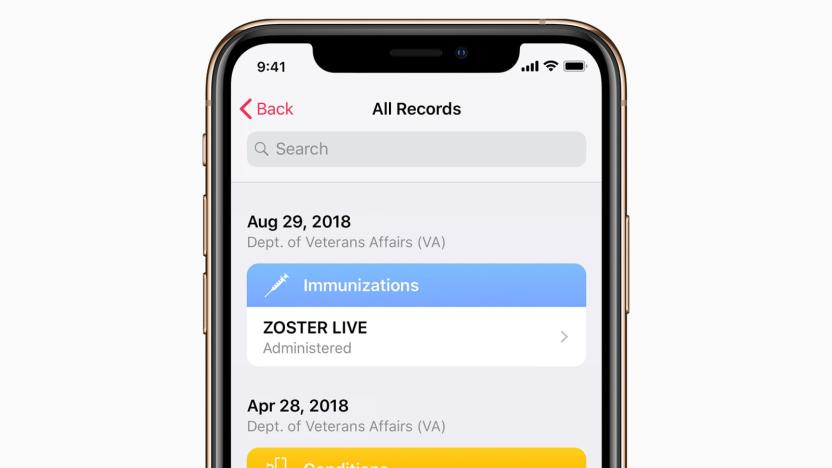healthrecords
Latest

Veterans can access their medical info through Apple's Health Records
Apple is expanding its Health Records feature in iOS to cover one of the larger groups in the US: namely, veterans. The company is partnering with the Department of Veterans Affairs to make servicemen and women's medical info available in one place on their iPhones, including known conditions, prescriptions and procedures. It's the record-sharing system "of its kind" at Veterans Affairs, Apple said.

iOS 11.3 will introduce new battery features and AR improvements
Apple is bringing iOS 11.3 to iPhones and iPads this spring, and today the company released a preview of what we can expect from the upgrade. The most notable improvements are the battery health indicator, upgrades to ARKit and the introduction of Health Records.

NY State to launch a patient portal that gives residents access to health records
If you've ever wished you had more immediate access to your health records beyond just asking your doctor for a copy, then you might want to consider a move to New York State. Dr. Nirav Shah, NY state's commissioner of health, has announced that New York will be the first state in the country to launch a new patient portal that'll give you access to your health records from the comfort of your home. Created by Mana Health and the New York eHealth Collaborative, the portal will incorporate information from the Statewide Health Information of New York (SHIN-NY) plus the state's All Payer Database. Shah also promises that all data will be interoperable so that records from different doctor's IT systems will play nice together. You won't just be able to view them either; Shah says that said data can also be plugged into third-party apps and services in case you want to manage your health in more detail.

London's E-Health Cloud program will send patient records to the stratosphere next month
You'd think that the recent spate of high-profile cyberattacks would've deterred the healthcare industry from sending patient records to the cloud -- but you'd be wrong. Beginning next month, all data on patients at London's Chelsea and Westminster Hospital will be stored in a centralized database, accessible from any computer, smartphone or tablet. Under the National Health Service's pilot program, known as E-Health Cloud, patients will be able to decide which doctors, nurses or family members can view their records, allowing them to easily share their data with other specialists. Flexiant, the Scottish software company that developed the platform, hopes to eventually expand it to other treatment phases, including assisted living, and insists that its system will help the NHS save money in the long-term. Security, however, will likely prove critical to the program's success. Users will have to pass multiple ID checkpoints to access the database, but privacy-wary Londoners might demand protection a bit more robust than an automated bouncer. You won't need to adhere to a dress code to view the full PR, available after the break.

IBM's Jeopardy-winning supercomputer headed to hospitals. Dr. Watson, we presume?
We always knew that Watson's powers extended well beyond the realm of TV trivia, and now IBM has provided a little more insight into how its supercomputer could help doctors treat and diagnose their patients. Over the past few months, researchers have been stockpiling Watson's database with information from journals and encyclopedias, in an attempt to beef up the device's medical acumen. The idea is to eventually sync this database with a hospital's electronic health records, allowing doctors to remotely consult Watson via cloud computing and speech-recognition technology. The system still has its kinks to work out, but during a recent demonstration for the AP, IBM's brainchild accurately diagnosed a fictional patient with Lyme disease using only a list of symptoms. It may be another two years, however, before we see Watson in a white coat, as IBM has yet to set a price for its digitized doc. But if it's as sharp in the lab as it was on TV, we may end up remembering Watson for a lot more than pwning Ken Jennings. Head past the break for a video from the University of Maryland School of Medicine, which, along with Columbia University, has been directly involved in IBM's program.



